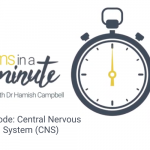MS-related brain fog affects many people living with MS. In fact, it’s estimated that more than half of people living with MS will develop cognitive issues. People may experience such things as forgetfulness, trouble concentrating, and confusion.
Brain fog is also referred to as “brain haze” or “cog fog” — short for cognitive fog.
As we know, MS is a disease of the central nervous system that affects the brain and spinal cord. It also causes areas of inflammation and lesions on the brain. No one MS lesion causes brain fog, but instead, seems more associated with an increased overall number of MS lesions in the brain.
On top of that, fatigue is also prevalent in people with MS, which can cause forgetfulness, lack of interest, and little energy. Losing your train of thought mid-sentence, forgetting why you entered a room, or struggling to remember a friend’s name are all possibilities when cog fog strikes.
The good news: There are immediate and long-term strategies for decreasing cog fog, or even just making it a bit more manageable. Your neurologist or MS nurse can guide you on modifiable lifestyle factors, restorative and compensatory techniques that can be developed to assist manage brain fog.
Our MS in a Minute videos were created to provide fast and factual definitions of commonly used terms in MS.
More resources:

